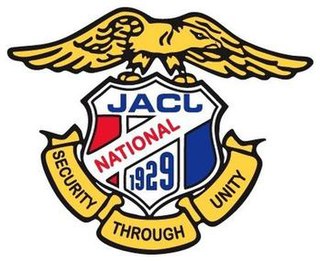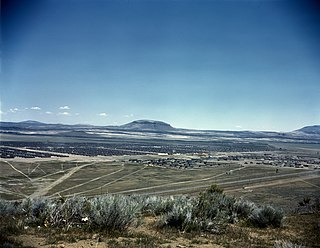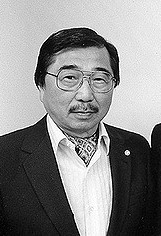
Japantown is a neighborhood in the Western Addition district of San Francisco, California.

The Civil Liberties Act of 1988 is a United States federal law that granted reparations to Japanese Americans who had been wrongly interned by the United States government during World War II. The act was sponsored by California Democratic congressman and former internee Norman Mineta, Wyoming Republican senator Alan K. Simpson and California senator Pete Wilson. The bill was supported by the majority of Democrats in Congress, while the majority of Republicans voted against it. The act was signed into law by President Ronald Reagan.

The Japanese American Citizens League is an Asian American civil rights charity, headquartered in San Francisco, with regional chapters across the United States.

The Tule Lake National Monument in Modoc and Siskiyou counties in California, consists primarily of the site of the Tule Lake War Relocation Center, one of ten concentration camps constructed in 1942 by the United States government to incarcerate Japanese Americans forcibly removed from their homes on the West Coast. They totaled nearly 120,000 people, more than two-thirds of whom were United States citizens.

Gordon Kiyoshi Hirabayashi was an American sociologist, best known for his principled resistance to the Japanese American internment during World War II, and the court case which bears his name, Hirabayashi v. United States.
Silkroad, formerly the Silk Road Project, Inc., is a not-for-profit organization, initiated by the cellist Yo-Yo Ma in 1998, promoting collaboration among artists and institutions, promoting multicultural artistic exchange, and studying the ebb and flow of ideas. The project was first inspired by the cultural traditions of the historical Eurasian Silk Road trade routes and now encompasses a number of artistic, cultural and educational programs focused on connecting people and ideas from around the world. It has been described as an "arts and educational organization that connects musicians, composers, artists and audiences around the world" and "an initiative to promote multicultural artistic collaboration."
The Boston University College of Fine Arts (CFA) at Boston University consists of the School of Music, the School of Theatre, and the School of Visual Arts. Each school offers degrees in the performing and visual arts at the undergraduate and graduate level. Among the College of Fine Arts faculty are artists, scholars, and performers. Since the College of Fine Arts is integrated into Boston University, students at CFA may choose courses in the other undergraduate colleges at Boston University. CFA students can also apply for the Boston University Collaborative Degree Program (BUCOP), where students simultaneously earn undergraduate degrees at CFA and in one of 14 undergraduate colleges of the university. The college offers a study abroad program in London, England, and Dresden, Germany. Students can spend a semester at the Royal College of Music, the London Academy of Music and Dramatic Art, or at the Hochschule für Musik "Carl Maria von Weber".
The Ensō String Quartet is a US-based string quartet. Formed in 1999, it released three CDs on the Naxos Records label, one of which was nominated for a "Best Chamber Music Performance" Grammy award. It won a number of competitions, including the 2003 Concert Artists Guild, 2004 Banff International String Quartet Competition, and the Fischoff National Chamber Music Competition.

Christopher Inadomi Tashima is a Japanese American actor and director. He is co-founder of the entertainment company Cedar Grove Productions and Artistic Director of its Asian American theatre company, Cedar Grove OnStage. Tashima directed, co-wrote, and starred in the 26-minute film Visas and Virtue for which he and producer Chris Donahue won the 1998 Academy Award for Live Action Short Film.
Tim Toyama is a playwright and producer. He is Sansei living in Los Angeles, California. He is co-founder of the Asian American media company Cedar Grove Productions, and its sister Asian American theatre company, Cedar Grove OnStage. He attended California State University, Northridge (CSUN) as an English major.

Cedar Grove Productions is an independent production company based in Los Angeles, California, specializing in media and theatre arts representing the Asian Pacific American community. Media projects are educational, with Visual Communications (VC) serving as a non-profit fiscal sponsor.
Hiroshi Kashiwagi was a Nisei poet, playwright and actor. For his writing and performance work on stage he is considered an early pioneer of Asian American theatre.
The following article focuses on the movement to obtain redress for the internment of Japanese Americans during World War II, and significant court cases that have shaped civil and human rights for Japanese Americans and other minorities. These cases have been the cause and/or catalyst to many changes in United States law. But mainly, they have resulted in adjusting the perception of Asian immigrants in the eyes of the American government.
The Carpe Diem String Quartet was founded in 2005 and is a classical string quartet based in Columbus, Ohio. The quartet's repertoire ranges from classical to contemporary chamber music. They regularly perform the works of contemporaries like Reza Vali, Richard Danielpour, Jonathan Leshnoff, Jessie Montgomery, Osvaldo Golijov, Gunther Schuller, Erberk Eryilmaz, Bruce Wolosoff, and Korine Fujiwara, as well as the works of classical composers such as Wolfgang Amadeus Mozart, Ludwig van Beethoven, Felix Mendelssohn, Joseph Haydn and countless others. Carpe Diem performs and tours regularly, in the United States, Canada, Japan, China, and Europe. The quartet is a strong proponent for the overlooked Russian composer Sergei Taneyev, and recorded his nine (9) string quartets, as well as his viola quintet, all for the Naxos label. The quartet regularly performs and collaborates with non-classical artists, including Willy Porter and Jayme Stone. A few of the outstanding artists with whom the quartet has played include Yo-Yo Ma, David Krakuaer, Raul Juarena, and Richard Stoltzman.
Soji Kashiwagi is a Sansei journalist, playwright and producer. He is the Executive Producer for the Grateful Crane Ensemble theatre company in Los Angeles. He has contributed to The Rafu Shimpo with his column, "Corner Store." He is the son of Nisei playwright Hiroshi Kashiwagi.
James Yutaka Matsumoto Omura was the English language editor of the Rocky Shimpo newspaper in Denver, Colorado, during World War II. He was an outspoken critic of the expulsion of people of Japanese ancestry from the west coast of the United States to concentration camps, following the Japanese attack on Pearl Harbor. Subsequently, he became a vocal champion of the Nisei draft resisters, providing a 'substantial anchor' to the work of the Heart Mountain Fair Play Committee by publishing their grievances in the Rocky Shimpo. At a time when the Japanese American Citizens League (JACL) preached passive conformity with the federal government as the best policy, Omura became the JACL's arch-enemy for counseling active resistance.

The Day of Remembrance is a day of observance for the internment of Japanese Americans during World War II. Events in numerous U.S. states, especially in the West Coast, are held on or near February 19, the day in 1942 that Executive Order 9066 was signed by President Franklin D. Roosevelt, requiring internment of all Americans of Japanese ancestry.
Damien Atkins is a Canadian actor and playwright.
Grayce Uyehara, née Kaneda, was a Japanese-American social worker and activist who led the campaign for a formal government apology for Japanese-American internment during World War II.








